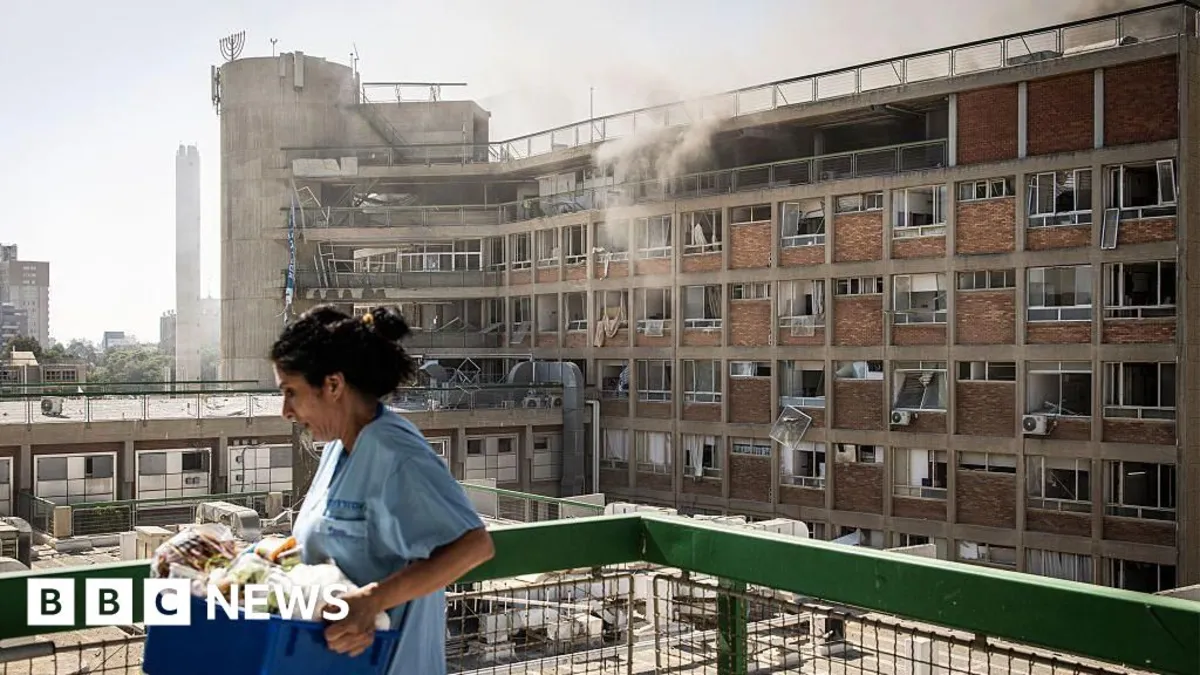
The situation in the Middle East is becoming increasingly volatile, with Iran's deputy foreign minister, Saeed Khatibzadeh, issuing a stark warning about the potential ramifications of US involvement in Israeli military actions. In an interview with the BBC, Khatibzadeh emphasized that this is not America’s war, suggesting that if President Donald Trump were to engage directly, he would be remembered as a leader who entered a conflict that he does not belong in. He argued that such involvement would likely escalate the situation into a quagmire, prolonging aggression and hindering efforts to end the ongoing atrocities in the region.
Khatibzadeh's comments come in the wake of a recent Iranian missile attack that hit the Soroka Medical Centre in southern Israel. Iranian state media reported that the strike targeted a military installation adjacent to the hospital rather than the hospital itself. In the aftermath of the attack, Israel’s Ministry of Health indicated that 71 people sustained injuries. Concurrently, Israel’s military announced that it had targeted Iran's critical nuclear sites, including the Arak heavy water reactor and the Natanz facility. However, Tehran has yet to provide updates regarding potential casualties from these Israeli strikes.
This escalation occurs at a pivotal moment, as the White House stated on Thursday that Trump would make a decision on whether the US will directly engage in the conflict within the next two weeks. Khatibzadeh reiterated that while diplomacy remains the preferred option, ongoing bombardments render the prospect of negotiations nearly impossible. He characterized Iran's military actions against Israel as acts of self-defense under Article 51 of the UN Charter, arguing that these actions were provoked by Israel's attacks on Iranian nuclear sites on June 13, which resulted in the deaths of several high-ranking Iranian military officials and scientists.
The Iranian deputy foreign minister also addressed Trump's assertions that the conflict could have been avoided if Iran had accepted a nuclear agreement. Khatibzadeh claimed that negotiations were ongoing until Israel disrupted discussions by launching attacks against Iran. "We were planning to have the sixth round of nuclear talks in Muscat, and we were actually on the verge of reaching an agreement," he stated. He further criticized Trump’s inconsistent social media messaging and interviews, suggesting that they indicate American awareness and participation in the escalating conflict.
Reports from Reuters indicate that US special envoy Steve Witkoff and Iranian Foreign Minister Abbas Araqchi have engaged in multiple phone conversations since Friday, aiming to find a diplomatic resolution to the crisis. However, Araqchi has made it clear that Iran will not return to negotiations unless Israel halts its attacks. Israel has accused Iran of taking steps to weaponize its enriched uranium stockpile, which could potentially be used for nuclear power or weapons. In response, Iran maintains that its nuclear program is entirely peaceful.
On Friday, the International Atomic Energy Agency (IAEA) reported that Iran has accumulated enough uranium enriched to 60% purity, which is a short technical step away from weapons-grade levels of 90%. Khatibzadeh dismissed these claims as baseless, stating, "You cannot start a war based on speculation or intention. If we wanted to have a nuclear bomb, we would have had it way before." He emphasized that Iran has not pursued any program aimed at developing nuclear weapons, instead focusing on peaceful nuclear activities.
In light of the escalating tensions, IAEA chief Rafael Grossi stressed that nuclear facilities should never be subject to military attacks, citing the potential harm to both people and the environment. Khatibzadeh also hinted at possible diplomatic avenues following the recent G7 summit in Canada, stating, “What we are hearing from Europeans is that they would like to get back to diplomacy at a ministerial level.” He expressed hope for an upcoming meeting in Geneva, indicating a willingness to engage in dialogue about the pressing issues at hand.